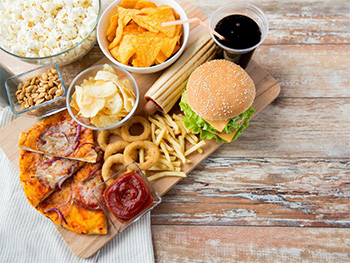Chronic inflammation has been subject of many debates. Recent research reveals that chronic inflammation occurs when our immune system gets stuck and attacks our own cells; the result could be extra weight gain, quick aging, autoimmune diseases, cancer, arthritis and heart disease (among other health concerns). Not only can your lifestyle add to inflammation, but what you choose to eat – or not eat directly impacts inflammation. It has been suggested that the best way to reduce chronic inflammation is through diet. When you supply your body with the nutrients it needs, it heals faster and can serve as a protective barrier against inflammation and infection.
Anti-Inflammatory Diet
An anti-inflammatory diet consists of foods such as high quality proteins, green leafy vegetables, fish such as salmon, healthy fats (extra virgin olive oil, avocados), and nuts. This is the natural diet we’re genetically programmed to need and it helps to reduce inflammation. Healing chronic inflammation isn’t just about adding anti-inflammatory foods, it’s also about getting rid of pro-inflammatory foods. The obvious culprits of inflammation are sugar and white flour, but there are also many other food-triggers to avoid:
Whole Wheat Grain
The sugar in whole wheat bread can raise blood glucose, causing body to produce higher levels of pro-inflammatory cytokines. Sugar also elevates levels of advanced glycation end products, which are destructive molecules that feed inflammation. The advice is to go grain-free or at least avoid gluten which is inflammatory.
 Seed Oils
Seed Oils
Seed oils like corn, soybean, sunflower, canola oil are heavily processed and have an unhealthy ratio of omega-6 to omega -3 fatty acids. They’re high in omega-6s which are pro-inflammatory and low in anti-inflammatory omega-3s. Substituting the aforementioned oils with healthy fats like coconut, olive, avocado oils is recommended.
Alcohol
Alcohol is naturally irritating to our insides, but shouldn’t necessarily cause lasting problems unless you overdo it. However, with too many drinks, bacteria can easily pass through the intestinal lining leading to increased inflammation. Though a small amount of alcohol has been linked to lowering heart disease and Alzheimer’s, too much can stop you from reaping the positive effects.
Soy Burgers
Soy extract suppresses iodine uptake and can stimulate the production of autoimmunogens that could put us at risk for autoimmune thyroid disease.
Diet Soda
Research points to artificial sweeteners as culprits for glucose intolerance which packs on belly fat; belly fat produces inflammatory chemicals. There is also speculation that artificial sweeteners play a role in inflammatory bowel disease.
Nonfat Fruit Yogurt
It has been observed that most people don’t tolerate dairy foods well. Symptoms like headaches, skin breakouts, boating, and stuffy nose clear up faster when avoiding dairy products which suggests that they cause inflammation inside our body. Also non-fat fruit yogurts are often loaded with pro-inflammatory sugar or artificial sweeteners and only contain a small amount of fruit. It’s recommended to switch to cultured coconut milk which gives the same probiotics as dairy yogurt. Regarding dairy in general, its suggested to go without it for 21 days and see if you feel much better.
To recap, it’s suggested we give our cells what they crave, which is natural, unprocessed foods that reduce inflammation. Also recommended is the supplementation with high grade/potency probiotics that play a role in digestion, regularity, immunity, nutrient production/absorption and production of short-chain fatty acids that promote a healthy colon.
The information provided is for general interest only and should not be misconstrued as a diagnosis, prognosis or treatment recommendation. This information does not in any way constitute the practice of medicine, or any other health care profession. Readers are directed to consult their health care provider regarding their specific health situation. Marque Medical is not liable for any action taken by a reader based upon this information.

Favorite Platform

New Content




